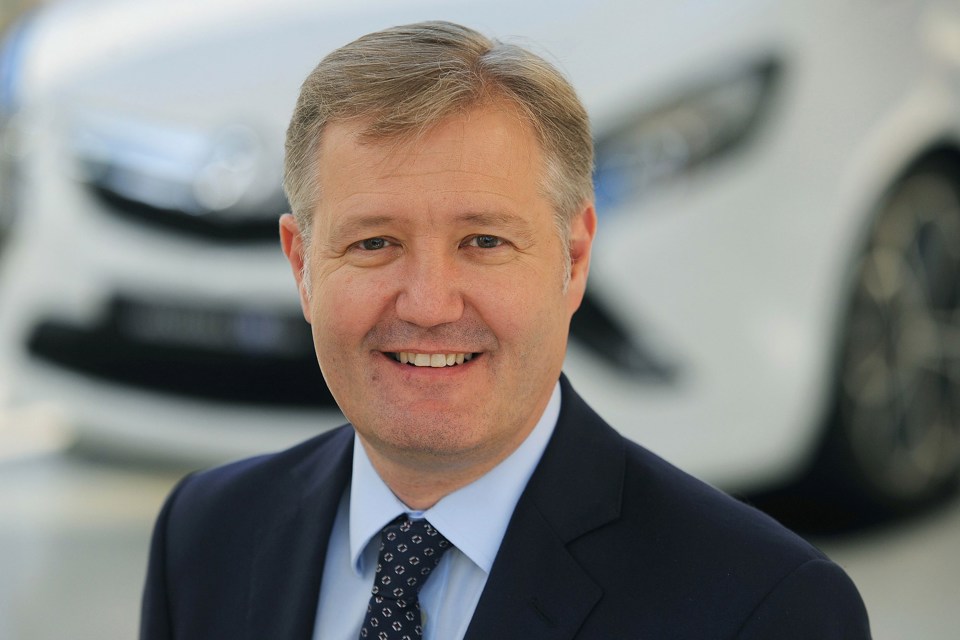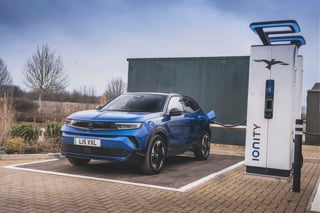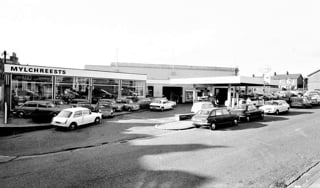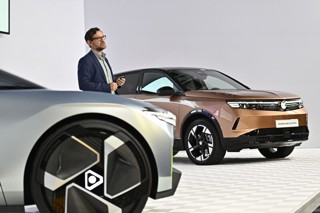In addition to this, few could have foreseen that Vauxhall’s chairman and managing director, Rory Harvey, would be called upon to defend the brand after wiring defects caused two of its big-selling models to hit the headlines following a string of fires.
Being forced by the surprise result of the EU referendum into discussions with Government ministers about safeguarding its UK manufacturing operation was equally unwelcome.
Vauxhall was among the manufacturers who increased prices in July and October – by 2.5% – but Harvey insisted “the volatility needs to stop”, adding: “What we don’t want to do is knee-jerk into a reaction.”
2016 was not Vauxhall’s best year. Full-year registrations fell almost 7% compared with 2015 and its market share fell almost a percentage point, to below the psychologically important 10% threshold for the first time this century.
In addition to this, few could have foreseen that Vauxhall’s chairman and managing director, Rory Harvey, would be called upon to defend the brand after wiring defects caused two of its big-selling models to hit the headlines following a string of fires.
Being forced by the surprise result of the EU referendum into discussions with Government ministers about safeguarding its UK manufacturing operation was equally unwelcome.
Vauxhall was among the manufacturers who increased prices in July and October – by 2.5% – but Harvey insisted “the volatility needs to stop”, adding: “What we don’t want to do is knee-jerk into a reaction.”
Stability will be a key aim for Vauxhall in 2017 - it has five new models launching.
Harvey said: “I’ve been with the company for 26 years and I think we’ve got the best product portfolio today that we’ve ever had, and going forward, we’re going to have a product portfolio that’s even better.”
Sitting alongside the Mokka X, the brand’s third-best seller, will be the B-segment Crossland X SUV, which Harvey claimed will attract “its own following”.
It will also launch the Insignia Grand Sport in the early part of the year, which will be joined by an Insignia Sports Tourer and rugged Country Tourer model.
Completing Vauxhall’s SUV/crossover family will be a new C-segment crossover.
Harvey acknowledged that an EV might have been another welcome addition and said that the Ampera E hatchback launched on the continent in 2016 would come to the UK, but wouldn’t specify when.
“A lot of what we’re introducing is going to provide incremental sales over and above our current portfolio, so, from a product renaissance point of view, we’ve got it sorted,” he said.
Weathering the sales storm
Vauxhall’s sales aspirations for 2016 were affected by the same mid-year cooling of the new car market as its big-selling rivals.
According to the SMMT, Vauxhall’s car registrations in 2016 were 250,955, down 6.97% on 2015, with market share down almost a full percentage point, from 10.24% to 9.32%.
Volkswagen was down 7.49% with its 207,028 registrations, with market share down from 8.5% to 7.69%, and Ford’s 318,316 registrations represent a 5.06% decline, against market share down from 12.73% to 11.82%.
Harvey said: “Some of that is strategic – we took a commercial decision to lose some of that volume.
“But, equally, some of it is that it’s a very competitive market environment at the moment. There’s no doubt that there are more players in the market, there’s no doubt that there’s more segments in the market and there’s no doubt that there’s an awful lot of good product out there.”
Harvey said pre-registration was “not something we encourage” as the brand attempted to preserve margins in 2017, but, echoing the comments of Now Motor Retailing’s managing director, Jon Taylor, in AM last summer, he said it came down to a “commercial decision” on the part of the retailer.
Vauxhall’s insulation from the effects of an ailing market may be limited by its late embrace of PCPs, with 20% of customers still keen to buy for cash and 10% on a PCH offer.
Harvey said PCP penetration had improved at Vauxhall, but there was still opportunity to improve from the current 55%. He said: “Two years ago, PCP was around 28% of our sales.
“It’s fair to say that we were a bit behind the tide, but we’re quite happy with where we are after what is a relatively short period of time.”
In the fleet sector, Vauxhall’s 2016 registrations fell 6.7%, from 146,601 to 136,778 year-on-year and Harvey intimated that there would be changes to secure “more quality” in the brand’s fleet dealing, with a reduction in daily rental, during 2017.
He said Vauxhall would be “doing what we can to continue to maintain margins and to drive through the more profitable areas of the business”.
Return-on-sales across the network has remained at 1.1% for the past three years, but Harvey believes efforts to increase service plan penetration above 50% could reap greater rewards, along with the new models in 2017.
Increased returns would be welcomed by the network, which is just coming to the end of a corporate identity makeover that has seen many move to new premises.
Dealers will clearly welcome this as the brand’s score for current and future profits suffered in the latest NFDA Dealer Attitude Survey, down from 6.4 to 5.1 and 6.3 to 5.4 respectively.
The manufacturer’s overall score was also down – from 6.5 in Winter 2015 to 5.9 in Summer 2016 – but was still ahead of its score in the Summer 2015 survey (5.3).
Vauxhall’s 2016 van registrations were down 9.6% year-on-year, at 37,727. This allowed it to maintain its number one slot in the retail commercial segment (although Ford is catching up fast), with sales of the Luton-built Vivaro contributing to a 15.5% market share.
Harvey said the UK dealer network was benefitting from the “resilience” of a commercial vehicle market that broke records in 2016.
Vauxhall’s van centres are part of its main franchised dealer network, with a separate franchise agreement that dictates they have specialist CV-trained staff and workshops with four-tonne vehicle lifts and the associated requirement for additional roof height.
Firefighting at home and abroad
Harvey was among a group of UK-based manufacturer representatives who met David Davis, the Secretary of State for Exiting the European Union, and DFT and BEIS officials at the SMMT’s London
headquarters before Christmas to discuss a “transition deal” that may mitigate losses amid a collapse in the value of the pound, fears of a similar slump in consumer confidence and potential trade tariffs of 10%.
Chuck Stevens, GM’s finance chief, had previously said Vauxhall’s US-based owner would take “whatever action is necessary” to balance the books of its European operation after losing $100 million from the fall in the pound’s value. He stated that GM expected a further Brexit-related hit of $300m before the end of 2016.
[gallery id=1312]
GM cut working hours at German factories making Vauxhall Corsa hatchbacks and Insignia saloons, for which the UK is the biggest market, but Harvey would not comment on the future of the 4,500 staff at Vauxhall’s Astra-producing Ellesmere Port and commercial vehicle operation in Luton. He said: “In terms of production, it is not affecting us at all. We’re still building at Ellesmere Port, Astra continues to build in terms of momentum and Vivaro continues to perform very well. We’re going to make something in the region of 80,000 Vivaros at Luton this year.
“The thing that is undoubtedly impacting is the cost of goods that come into the UK with the devaluation of the pound. That’s something that we are watching very carefully and I guess it’s something that does compromise our margins.”
Apart from dealing with the political and economic ramifications of Brexit, Harvey has also had to oversee recalls of the Zafira B and Corsa D after a series of well publicised fires.
The manufacturer recalled 230,000 UK-based Zafira B people carriers in 2015 after an investigation uncovered that a fault with a fuse resistor could lead to fires and the problem was, in many cases, compounded by makeshift fixes.
A subsequent BBC Watchdog investigation into fires in a number of Corsa D hatchbacks, resulting from an electrical fault on 1.4 Turbo models produced between 2006 and 2014, provided another headache for the brand.
Almost 2,700 Corsa Ds had been recalled at the time of the report, but The Sun later speculated that the issues may be more widespread, reporting that a recall of every Corsa D and E would involve 1.1million vehicles and would cost the brand about £200m.
A spokesman for Vauxhall dismissed the claims and said the newspaper was wrong to compare the wiring of the Corsa to that of GM’s Hummer H3, which was affected by fires in the US.
Harvey was quick to highlight the positives in Vauxhall’s response, particularly the contribution of its dealer network.
He told AM: “We have completed approximately 50% of Zafira recalls which means that we are getting through around 2,000 a day, which is absolutely fantastic.
“The dealers have done a superb job in terms of supporting us and we are doing everything we can in order to expedite it.
“We’ve worked with our dealers to ensure that they have expanded capacity and are making the overtime available. This week, the mailing goes out for all those who have yet to have their car re-worked.”
 Harvey said dealers had received an “agreed warranty rate” to rework the recalled Zafira Bs and Corsa Ds.
Harvey said dealers had received an “agreed warranty rate” to rework the recalled Zafira Bs and Corsa Ds.
Asked if such situations could be better handled in future, he said he wanted a greater flow of information from insurers to allow issues to be investigated and identified at an earlier stage, describing it as “an industry-wide issue”, which Vauxhall is working alongside the SMMT to address.
“There are 18,000 fires in a car per year of which about a third were arson and then two thirds were for another reason, but it’s very, very difficult to get hold of that data.
“It is part of the challenge for automotive manufacturers as a whole that this data isn’t readily available.”
Dealing with the changing face of retail
A dealer network made up of a combination of core sites and satellite facilities providing retail and servicing equips Vauxhall with a broad geographic reach, with just three current open points, which Vauxhall would not specify.
The format results in the brand’s 233 core locations exerting more influence over the total 388 sites. Roughly 50% of the network is under what the brand defines as large group ownership.
Online sales and changing customer demand are part of the retail challenge in the coming years Harvey said the brand was “ahead of the game” with an online sales channel called Vauxhall Internet Purchase more than 20 years ago, when he was a field operations manager. However, the channel generated only limited volume.
He acknowledged that, while Vauxhall customers can configure a car online and gain a representative finance offer – without an individual credit check – there is no online purchase option. However, he added: “Watch this space towards the end of 2017.”
Possibly of greater immediate significance to retailers is Vauxhall’s switch to a new lead management system called Lead Connect over the past 12 months.
Taking the place of the Lead It platform, it promises to integrate how the manufacturer feeds leads out to retailers and will also “reconcile what retailers are doing with leads” and integrate a new data-sharing system.
The system is a key component in meeting the needs of “time-poor” modern customers, according to Harvey.
Vauxhall’s retail network staff benefit from an academy at the brand’s Luton headquarters and a training team that visits dealer sites.
A series of ‘connected roadshows’, hosted throughout the UK, and a ‘digital training program’ at the academy, recently sought to train sales teams on the best way to deal with customer enquiries and online engagement.
Everything from swift responses to identifying when to contact an existing customer to turn them into a new vehicle was on the agenda.
Login to continue reading
Or register with AM-online to keep up to date with the latest UK automotive retail industry news and insight.






















Login to comment
Comments
No comments have been made yet.